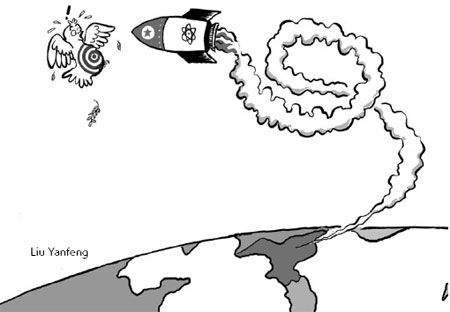DPRK changes the rules of the nuclear game
On Monday, the Democratic People's Republic of Korea (DPRK) shocked the world by conducting an underground nuclear test. It ignored international condemnation and test-fired two short-range missiles on Tuesday, and one again yesterday, adding to the three that it had tested the day before.
Despite the strong opposition of the international community, the DPRK continues to advance its nuclear weapons program and move farther away from the Six-Party Talks. Even people who hoped the DPRK could be persuaded to abandon its nuclear program through negotiations have been shocked by reality. It seems the possibility of the DPRK voluntarily abandoning its nuclear program now exists only in theory.
But the nuclear test can serve several purposes, with the DPRK's diplomatic need being one. The DPRK seems to have learnt a lesson from its interactions with the US. After Pyongyang conducted its first nuclear test in October 2006, the Bush administration softened its stance, and walked to the negotiations table.
After taking over the Oval Office, Barack Obama has shown willingness to engage with Pyongyang, but he still sticks to a hard line on the nuclear issue. The Lee Myung-bak government of the Republic of Korea (ROK) has returned to its old hard-line position, too.
This has made the DPRK believe that it is very difficult to change the attitudes of the US and the ROK in a short time. So if it restarts its abandoned nuclear program it could help it extract some benefits from some parties.
Technological advancement could be another reason why the DPRK conducted the nuclear test. It tested a rather crude device three years ago - the technology used was outdated and the energy generated, very low. The general agreement among experts was that it was not a success. The DPRK must have identified the faults and sought to rectify them by testing another device.
The DPRK will need many more tests before its technology reaches a standard level. The US, for example, has conducted more than 1,000 nuclear tests, once carrying out more than 80 in a month. The DRPK waited three years for its second test, but it may not wait for another three to conduct its third.
Pyongyang seems to have improved its technology and device both this time. The yield of the blast might have been 4 kilotons of TNT equivalent (some even speculate that it was 10 kilotons), which might be 10 to 50 times as powerful as the first, and as powerful as the atom bombs dropped by the US on Hiroshima and Nagasaki. That's why the DPRK's nuclear deterrence now looks more credible.
Pyongyang's second nuclear test is aimed at domestic politics, too. Its economy is not in a good shape and it still faces difficulties in food supplies. Conducting new nuclear tests seems to be an effective way for the government to consolidate power.
Pyongyang's diplomatic steps were not polished enough when it conducted its first nuclear test. It didn't even inform its neighbors in advance, and hence was criticized by many stakeholders. But it is likely that it informed some of them in advance this time. Hence, the response of the international community has been calmer on the whole compared with the last time.
The DPRK has made it clear by testing five missiles in three days that its nuclear program's target is nuclear weapons carried by missiles. By doing so, it hopes to build a powerful nuclear deterrent, hence, it is not expected to flip-flop on its missile program, and destroy its already developed nuclear facilities in exchange for the US' lip service any more.

Pyongyang thinks it will gain more than it will lose from the nuclear test. After it conducted its first test in 2006, the UN Security Council adopted Resolution 1718, imposing a ban on import of nuclear weapons technology, missile technology, heavy conventional weapons and other things by Pyongyang.
But the resolution did not have the desired effect. So even if the UN Security Council holds a meeting to discuss the nuclear test this time, it may desist from resolving to punish the DPRK because instead of following its earlier resolution Pyongyang has taken an even bolder step.
The defiance by the DPRK has challenged and international peace and security. But again the UN has been losing its power. It turned a blind eye and did not react to some countries' illegal acts. With its authority battered, it maintained a stony silence when the US invaded Iraq.
Pyongyang's nuclear test is a challenge for the Obama administration, too. Obama and Bush both dislike the DPRK. The difference is that Bush initially refused to hold talks with the DPRK but was forced to do so after it conducted its first nuclear test, while Obama believes the nuclear issue should be resolved through dialogue.
Though Obama favors dialogue, he definitely does not want to be forced by Pyongyang to the negotiations table. And the DPRK's nuclear test just four months into Obama's presidency has come as an untimely shock to the White House.
Though the DPRK has fully grasped the rules of the game, it still poses a challenge because it does not seem to see any positive change on the international scene, and has given up hope of improving its status in Northeast Asia in the short run. It can still expect one thing: the changing situation becoming favorable because it now possesses nuclear bombs but for that it needs to be a bit more patient.
It is clear that the Six-Party Talks have suffered another heavy blow. But the DPRK's nuclear test will not nullify the diplomatic initiative of China for regional stability. The nuclear test, however, urges us to think how to reorient the talks under the changed circumstances.
The author is director of the Center of American Studies at Shanghai-based Fudan University.
(China Daily 05/28/2009 page9)














